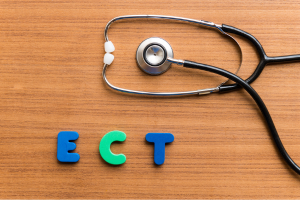Electroconvulsive Therapy (ECT)

Electroconvulsive Therapy (ECT): A Safe and Effective Treatment for Severe Mental Health Conditions (drop down)
At Manoshanti Neuropsychiatry Clinic, we strive to provide the most effective and evidence-based treatments for our patients. One such treatment is Electroconvulsive Therapy (ECT), a highly effective option for individuals with severe mental health conditions that have not responded to other forms of treatment. Despite some misconceptions, ECT is a safe, well-regulated procedure that can bring life-changing improvements to those in need.
What is ECT?
Electroconvulsive Therapy (ECT) is a medical treatment in which small, carefully controlled electrical currents are passed through the brain while the patient is under general anesthesia. This induces a brief, controlled seizure that helps to “reset” brain activity, leading to significant improvement in mental health symptoms.
ECT is often recommended for severe or treatment-resistant conditions, including:
- Major Depressive Disorder (MDD): Particularly when symptoms are life-threatening, such as in cases of suicidal ideation or refusal to eat.
- Bipolar Disorder: During episodes of severe mania or depression.
- Schizophrenia: For patients with catatonia, severe psychosis, or poor response to medications.
- Catatonia: A state of unresponsiveness or immobility associated with various psychiatric or medical conditions.
- Severe Postpartum Depression: When quick recovery is essential for the mother and baby.
How Does ECT Work?
Although the exact mechanism of action is not fully understood, ECT is believed to work by altering brain chemistry and improving communication between different areas of the brain. It is thought to enhance the release of neurotransmitters such as serotonin, dopamine, and norepinephrine, which play critical roles in mood regulation.
What to Expect During ECT
- Pre-Treatment Preparation:
- A thorough medical evaluation is conducted to ensure the procedure is safe for you. This includes blood tests, an electrocardiogram (ECG), and an anesthetic assessment.
- You will be asked to fast for a few hours before the procedure.
- During the Procedure:
- You will be placed under general anesthesia to ensure you are completely unconscious and comfortable.
- A muscle relaxant is administered to minimize physical movement during the seizure.
- Electrodes are placed on the scalp, and a controlled electrical stimulus is delivered for a few seconds, inducing a brief seizure (lasting 20–60 seconds).
- Post-Treatment Recovery:
- After the procedure, you will be monitored in a recovery area until the effects of anesthesia wear off.
- Most patients can return home the same day, accompanied by a caregiver.
Safety and Side Effects of ECT
Is ECT Safe?
Yes, ECT is a safe and highly regulated procedure. It is performed under strict medical supervision and is well-tolerated by most patients. Advances in technology and anesthesia have made modern ECT much safer than in the past.
Possible Side Effects:
While ECT is generally safe, some temporary side effects may occur, including:
- Short-term memory loss: Difficulty recalling events immediately before or after treatment. This usually resolves within weeks.
- Confusion: More common in older adults and typically short-lived.
- Headaches or muscle aches: Mild discomfort that can be treated with over-the-counter pain relievers.
- Nausea: Occasionally caused by anesthesia.
Benefits of ECT
ECT can provide rapid and significant relief from severe symptoms when other treatments, such as medications or psychotherapy, have not been effective. Some of its key benefits include:
- Fast-Acting: ECT is especially valuable in emergencies, such as when there is a risk of suicide.
- Effective for Treatment-Resistant Conditions: Offers hope to individuals who have not responded to other therapies.
- Improved Quality of Life: Many patients experience a marked improvement in their ability to function and enjoy life.
Common Myths About ECT
- Myth: ECT is painful.
Fact: ECT is performed under general anesthesia, so you will not feel any pain during the procedure. - Myth: ECT causes permanent memory loss.
Fact: While temporary memory issues may occur, permanent memory loss is rare and minimized with modern techniques. - Myth: ECT is outdated or dangerous.
Fact: Modern ECT is a safe, effective, and scientifically validated treatment used worldwide.
Who Can Benefit from ECT?
ECT is recommended for individuals who:
- Have severe depression, bipolar disorder, or schizophrenia that has not responded to medication or therapy.
- Are experiencing life-threatening symptoms such as suicidal thoughts or refusal to eat.
- Cannot take medications due to severe side effects or medical conditions.
ECT at Manoshanti Neuropsychiatry Clinic
At Manoshanti Neuropsychiatry Clinic, we follow stringent safety protocols to ensure the best outcomes for our patients. Our team of experienced psychiatrists and anesthetists work together to provide compassionate care throughout the treatment process.
Take the First Step Toward Recovery
If you or a loved one is struggling with a severe mental health condition, Electroconvulsive Therapy (ECT) may be the solution. At Manoshanti Neuropsychiatry Clinic, we are committed to helping you find relief and regain control of your life.
Contact us today to schedule a consultation and explore how ECT can make a difference.
